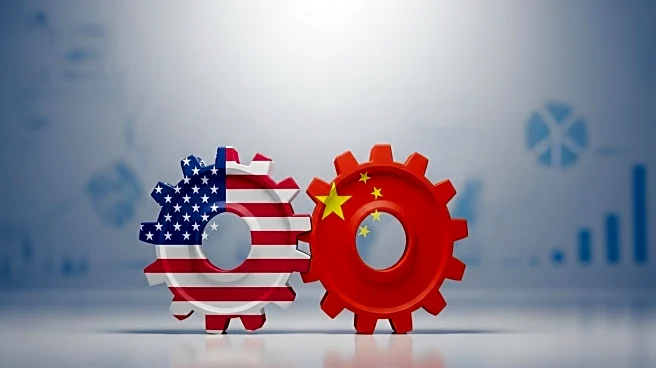What's Happening?
On October 13, 2025, U.S. markets experienced a rebound following President Trump's softened stance on trade negotiations with China. After a tumultuous Friday where the S&P 500 fell by 2.7% and the Dow Jones Industrial Average dropped by 1.9%, Monday saw gains in futures for these indices, with the Dow rising 0.9% and the S&P 500 increasing by 1.2%. The technology-heavy Nasdaq also saw a 1.7% rise. This market recovery was influenced by President Trump's more conciliatory tone over the weekend, despite not retracting his threat to increase tariffs on Chinese goods. The President expressed a desire to assist China rather than harm it, which helped ease investor concerns. Chipmakers, including Advanced Micro Devices and Micron, were among the biggest gainers, reflecting optimism in the tech sector.
Why It's Important?
The easing of trade tensions between the U.S. and China is significant for several reasons. Firstly, it impacts global economic stability, as the two countries are major players in international trade. A more moderate approach from President Trump could lead to improved relations and reduced market volatility, benefiting investors and businesses reliant on international trade. The tech industry, particularly chipmakers, stands to gain from reduced tensions, as these companies are heavily dependent on global supply chains. Additionally, the potential for a breakthrough in trade negotiations could positively influence upcoming earnings reports from major U.S. banks and corporations, further stabilizing the market.
What's Next?
Looking ahead, the focus will be on the U.S. banks as they begin to release their quarterly earnings reports, which could provide further insights into the economic impact of trade tensions. Additionally, the ongoing U.S. government shutdown remains a critical issue that could affect market dynamics. Stakeholders will be closely monitoring any developments in trade negotiations between the U.S. and China, as well as domestic policy changes that could influence economic conditions. The tech sector, in particular, will be watching for any shifts in trade policy that could affect supply chains and production costs.
Beyond the Headlines
The softened trade stance may also have deeper implications for U.S.-China relations, potentially leading to a shift in diplomatic strategies. This could influence long-term economic policies and international alliances. Furthermore, the situation highlights the complex interplay between political rhetoric and market reactions, emphasizing the need for careful negotiation and communication in international trade discussions.








